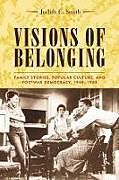Visions of Belonging
Einband:
Fester Einband
EAN:
9780231121705
Untertitel:
Family Stories, Popular Culture, and Postwar Democracy, 1940-1960
Genre:
Soziologie
Autor:
Judith Smith
Herausgeber:
Columbia University Press
Anzahl Seiten:
464
Erscheinungsdatum:
01.09.2004
ISBN:
978-0-231-12170-5
Autorentext
Judith E. Smith
Klappentext
Visions of Belonging explores how beloved and still-remembered family stories -- A Tree Grows in Brooklyn, I Remember Mama, Gentleman's Agreement, Death of a Salesman, Marty, and A Raisin in the Sun -- entered the popular imagination and shaped collective dreams in the postwar years and into the 1950s. These stories helped define widely shared conceptions of who counted as representative Americans and who could be recognized as belonging. The book listens in as white and black authors and directors, readers and viewers reveal divergent, emotionally textured, and politically charged social visions. Their diverse perspectives provide a point of entry into an extraordinary time when the possibilities for social transformation seemed boundless. But changes were also fiercely contested, especially as the war's culture of unity receded in the resurgence of cold war anticommunism, and demands for racial equality were met with intensifying white resistance. Judith E. Smith traces the cultural trajectory of these family stories, as they circulated widely in bestselling paperbacks, hit movies, and popular drama on stage, radio, and television. Visions of Belonging provides unusually close access to a vibrant conversation among white and black Americans about the boundaries between public life and family matters and the meanings of race and ethnicity. Would the new appearance of white working class ethnic characters expand Americans'understanding of democracy? Would these stories challenge the color line? How could these stories simultaneously show that black families belonged to the larger "family" of the nation while also representing the forms of danger and discriminations that excluded them from full citizenship? In the 1940s, war-driven challenges to racial and ethnic borderlines encouraged hesitant trespass against older notions of "normal." But by the end of the 1950s, the cold war cultural atmosphere discouraged probing of racial and social inequality and ultimately turned family stories into a comforting retreat from politics. The book crosses disciplinary boundaries, suggesting a novel method for cultural history by probing the social history of literary, dramatic, and cinematic texts. Smith's innovative use of archival research sets authorial intent next to audience reception to show how both contribute to shaping the contested meanings of American belonging.
Zusammenfassung
Explores how the family stories entered the popular imagination and shaped collective dreams in the postwar years and into the 1950s. This book also provides access to a vibrant conversation among white and black Americans about the boundaries between public life and family matters, and the meanings of race and ethnicity.
Inhalt
Acknowledgments Part 1 Ordinary Families, Popular Culture, and Popular Democracy, 1935-1945 Radio's Formula Drama Popular Theater and Popular Democracy Popular Democracy on the Radio Popular Democracy in Wartime: Multiethnic and Multiracial? Representing the Soldier The New World of the Home Front Soldiers as Veterans: Imagining the Postwar World Looking Back Stories Part 2 Making the Working-Class Family Ordinary: A Tree Grows in Brooklyn From Working-Class Daughter to Working-Class Writer Revising 1930s Radical Visions Remembering a Working-Class Past Instructing the Middle Class The Ethnic and Racial Boundaries of the Ordinary Making Womanhood Ordinary Hollywood Revises A Tree Grows in Brooklyn The Declining Appeal of Tree's Social Terrain Part 3 Home Front Harmony and Remembering Mama "Mama's Bank Account" and Other Ethnic Working-Class Fictions Remembering Mama on the Stage The Mother Next Door on Film, 1947-1948 Mama on CBS, 1949-1956 The Appeal of TV Mama's Ordinary Family "Trading Places" Stories Part 4 Loving Across Prewar Racial and Sexual Boundaries Lillian Smith and Strange Fruit Quality Reinstates the Color Line Strange Fruit as Failed Social Drama The Returning Negro Soldier, Interracial Romance, and Deep Are the Roots Interracial Male Homosociability in Home of the Brave Part 5 "Seeing Through" Jewishness Perception and Racial Boundaries in Focus Policing Racial and Gender Boundaries in The Brick Foxhole Recasting the Victim in Crossfire Deracializing Jewishness in Gentleman's Agreement Part 6 Hollywood Makes Race (In)Visible "A Great Step Forward": The Film Home of the Brave Lost Boundaries: Racial Indeterminacy as Whiteness Pinky: Racial Indeterminacy as Blackness Trading Places or No Way Out? Everyman Stories Part 7 Competing Postwar Representations of Universalism The "Truly Universal People": Richard Durham's Destination Freedom The Evolution of Arthur Miller's Ordinary Family Miller's Search for "the People," 1947-1948 The Creation of an Ordinary American Tragedy: Death of a Salesman The Rising Tide of Anticommunism Part 8 Marital Realism and Everyman Love Stories Marital Realism Before and After the Blacklist The Promise of Live Television Drama Paddy Chayefsky's Everyman Ethnicity Conservative and Corporate Constraints on Representing the Ordinary Filming Television's "Ordinary": Marty's Everyman Romance Part 9 Reracializing the Ordinary American Family: Raisin in the Sun Lorraine Hansberry's South Side Childhood Leaving Home, Stepping "Deliberately Against the Beat" The Freedom Family and the Black Left "I Am a Writer": Hansberry in Greenwich Village Raisin in the Sun: Hansberry's Conception, Audience Reception Frozen in the Frame: The Film of Raisin Visions of Belonging Notes Index

Leider konnten wir für diesen Artikel keine Preise ermitteln ...
billigbuch.ch sucht jetzt für Sie die besten Angebote ...
Die aktuellen Verkaufspreise von 6 Onlineshops werden in Realtime abgefragt.
Sie können das gewünschte Produkt anschliessend direkt beim Anbieter Ihrer Wahl bestellen.
Loading...
Die aktuellen Verkaufspreise von 6 Onlineshops werden in Realtime abgefragt.
Sie können das gewünschte Produkt anschliessend direkt beim Anbieter Ihrer Wahl bestellen.
| # | Onlineshop | Preis CHF | Versand CHF | Total CHF | ||
|---|---|---|---|---|---|---|
| 1 | Seller | 0.00 | 0.00 | 0.00 |
